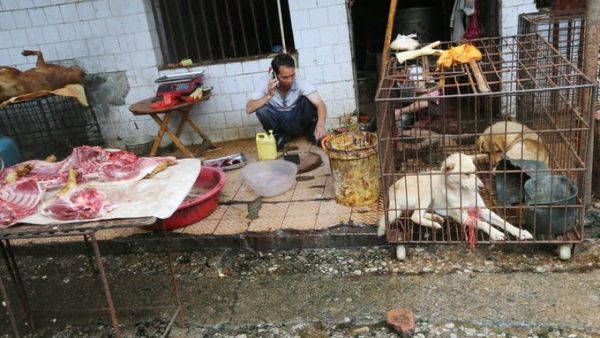A company specialising in making dog meat dishes has claimed that eating dogs is a way for Chinese people to show their 'cultural confidence'.
Fankuai Dog Meat from eastern China made the statement in a blog post while protesting against a proposed law which bans people from consuming pets in the wake of the coronavirus outbreak.
The brand claims that lawmakers in the city of Shenzhen drafted the proposal to appease the West.
Fankuai produces a wide range of dishes, including hand-shredded dog meat, spicy dog meat and dog meat braised in a turtle broth.
Based in the county of Pei in Jiangsu Province, the firm is named after an ancient Chinese general who allegedly made his living by butchering dogs in his early years.
The company published the strongly worded article last Thursday to condemn the potential policy from Shenzhen, which borders Hong Kong.
The commentary blasted the city's plan as a 'denial to thousands of years of Chinese food culture'.
It claimed that relevant officials had stood on the opposite side of the general public and drawn the proposal to appease the West, which is used to 'bullying' Chinese culture.
It also said that the proposal represented 'extreme dog lovers' and created 'inharmonious social atmosphere'.
The firm said it supported Beijing's new law to ban the eating of wild animals, but criticised the Shenzhen authority for extending the restriction 'infinitely' to including 'livestock'.
It then argued that people in various Chinese provinces 'have a history of eating dogs for two to three thousand years', therefore the proposal 'strips people of their freedom of eating dog meat'.
The article went on to allege that the proposition from Shenzhen protected the interests of 'extreme dog lovers'.
'Extreme dog lovers are influenced by the extremist thoughts from the West and appease Western rubbish culture without limit,' it wrote.
The author concluded its criticism by urging Shenzhen not to pass the law.
The post has been removed from the company's WeChat account after it had sparked an uproar among Chinese animal activists.
The company has refused an interview request from MailOnline on the matter. One representative cited 'sensitive topics' as the reason for the rejection.
Animal activists have demanded the Chinese government prohibit the consumption of dogs for years.
The annual Yulin Dog Meat Festival is one of the most controversial food festivals in China and sees thousands of dogs cruelly killed, skinned and cooked with blow-torches before being eaten by the locals.
If this proposal from Shenzhen gets passed, it will be the first of its kind in the country.
Apart from dogs, the proposed act bars snake, frog and turtle meat from the dinner table.
Lawmakers from Shenzhen, a city of around 13 million people, published the proposal on February 25 on its government's website.
The public had until March 5 to send in their feedback to the document.
Fankuai's controversial claims came after a Chinese scholar said that the country should ban the eating of dogs and cats completely, not just in Shenzhen, to 'restore its international image'.
Guo Changgang, an academic from Shanghai, called for Beijing to set up legislation and impose the restriction across the country.
'The consumption of dog meat and cat meat has never been a social custom that is 'widely accepted by the people',' claimed Mr Guo, the head of the History Research Centre of the Shanghai Academy of Social Sciences.
He acknowledged the government's efforts to crack down on the wildlife trade to prevent the spread of the novel coronavirus.
But he hoped that national lawmakers could extend the protection to cover companion animals.
'Eating wild animals, dog meat and cat meat is one of the important elements that damage China's international image,' he wrote on news app Toutiao.
This article has been adapted from its original source.








